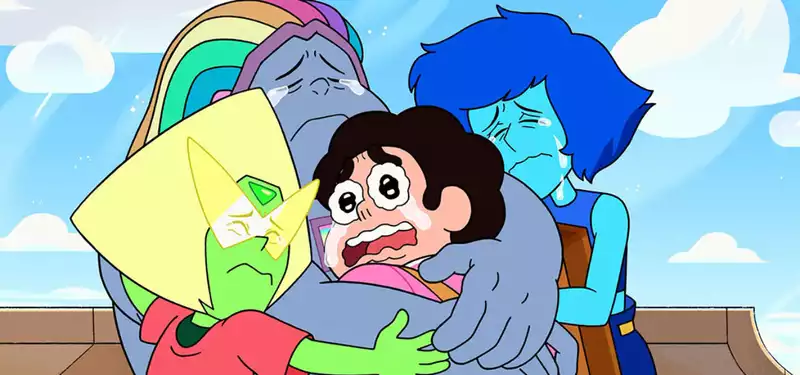Aug 6, 2020
Cartoon Network told Rebecca Sugar not to speak publicly about the queer themes of Steven Universe.
Steven Universe, which ended its run earlier this year, was a groundbreaking series that portrayed nonbinary identities and lesbian romance with a frankness unprecedented in mainstream animated television. Its influence was further strengthened when its creator, Rebecca Sugar, came out publicly as a bisexual nonbinary woman.
To begin with, the series' producer, Cartoon Network, did not want this to happen. As Sugar revealed to Paper magazine, studio executives tried to stop the depiction of gay romance. Even after they finally relented, they tried for years to stop Sugar from talking about this aspect of the show in public.
According to Sugar, by 2014, the executives understood that the characters Ruby and Sapphire (pictured above) represented a lesbian couple." They told us point-blank, "You cannot have these characters in a romantic relationship."
Sugar adds, however, that this could not be changed because the characters were too entrenched and the production was too far along.
Instead, she was told that she "could not discuss [the relationship] publicly" or else "the show would be pulled from many countries and that could mean the end of the show." The studio was able to talk it out around 2015 or 2016, at which point Sugar was "honestly, really mentally ill." She later came out as bisexual, tying this fact to the theme of the show.
The success of Steven Universe brought industry attention to the theme of LGBTQ+ representation and paved the way for other shows that embrace queer positivity. One such show was She-Ra and the Princesses of Power, produced by DreamWorks Animation for Netflix, where creator Noelle Stevenson was interviewed alongside Sugar for Paper.
Stevenson's experience is similar to Sugar's. 'At first, it seemed like I was going to get support [for queer characters] from the company,' she says. 'Then the 2016 election happened and everyone got really scared. ...... We were told in no uncertain terms that we couldn't do this."
Both showrunners credit fans for picking up on and celebrating coded queer relationships, which has led executives to change their minds and be more supportive. As Stevenson puts it, "I felt like in the last season we were able to be open and clear about what we were doing, whereas in past seasons we had to be vague in other words"
.
In a wide-ranging conversation, the two touch on a variety of issues surrounding queer representation in animation: recent advances, the risk of complacency, the constant threat of backlash, and the influence of the comics world. Interestingly, they speak after their respective shows have ended (She-Ra's final season began in May). Progress may be happening, but the situation for queer storytellers in the industry remains far from ideal.




Post your comment